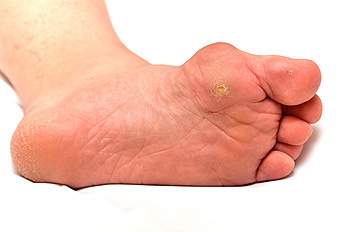What Is a Bunion?
Monday, 01 April 2019 00:00 Bunions are visible deformities located at the joint of the big toe and they can cause discomfort or pain. Bunions are either genetic or arthritic. Genetic bunions are hereditary, while arthritic bunions are caused by external factors. Examples of external factors are regularly wearing heels or experiencing an injury to the foot. Both types of bunions can vary in their size and degree of pain. The size of a bunion is not indicative of how much discomfort and pain it causes. It is possible for a large bunion to cause no pain, while a small bunion may result in extreme pain. The amount of pain a bunion causes also increases by the amount of pressure applied to the joint and how regularly you are on your feet. If you have a bunion and it concerns you, then it is recommended that you speak with a podiatrist to learn more about the condition.
Bunions are visible deformities located at the joint of the big toe and they can cause discomfort or pain. Bunions are either genetic or arthritic. Genetic bunions are hereditary, while arthritic bunions are caused by external factors. Examples of external factors are regularly wearing heels or experiencing an injury to the foot. Both types of bunions can vary in their size and degree of pain. The size of a bunion is not indicative of how much discomfort and pain it causes. It is possible for a large bunion to cause no pain, while a small bunion may result in extreme pain. The amount of pain a bunion causes also increases by the amount of pressure applied to the joint and how regularly you are on your feet. If you have a bunion and it concerns you, then it is recommended that you speak with a podiatrist to learn more about the condition.
If you are suffering from bunions, contact one of our podiatrists of Accent Podiatry Associates. Our doctors can provide the care you need to keep you pain-free and on your feet.
What Is a Bunion?
A bunion is formed of swollen tissue or an enlargement of boney growth, usually located at the base joint of the toe that connects to the foot. The swelling occurs due to the bones in the big toe shifting inward, which impacts the other toes of the foot. This causes the area around the base of the big toe to become inflamed and painful.
Why Do Bunions Form?
Genetics – Susceptibility to bunions are often hereditary
Stress on the feet – Poorly fitted and uncomfortable footwear that places stress on feet, such as heels, can worsen existing bunions
How Are Bunions Diagnosed?
Doctors often perform two tests – blood tests and x-rays – when trying to diagnose bunions, especially in the early stages of development. Blood tests help determine if the foot pain is being caused by something else, such as arthritis, while x-rays provide a clear picture of your bone structure to your doctor.
How Are Bunions Treated?
- Refrain from wearing heels or similar shoes that cause discomfort
- Select wider shoes that can provide more comfort and reduce pain
- Anti-inflammatory and pain management drugs
- Orthotics or foot inserts
- Surgery
If you have any questions, please feel free to contact our offices located in Arlington and Mansfield, TX . We offer the newest diagnostic and treatment technologies for all your foot care needs.




